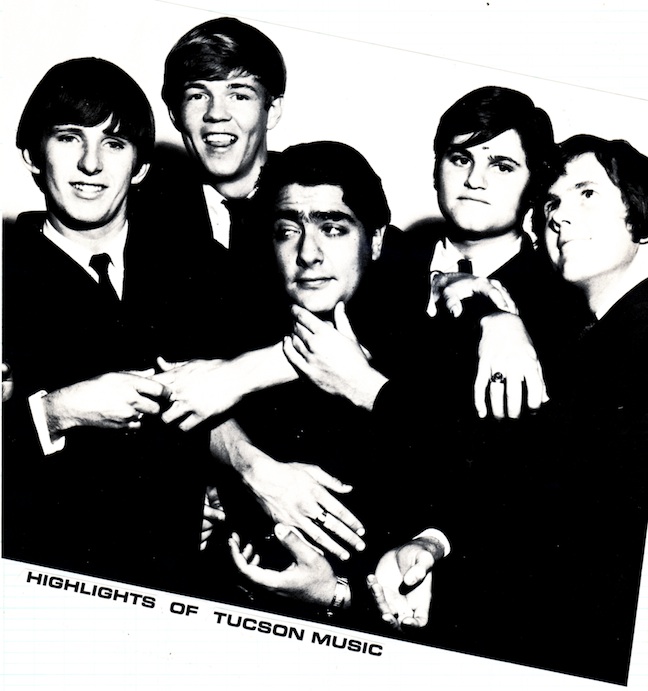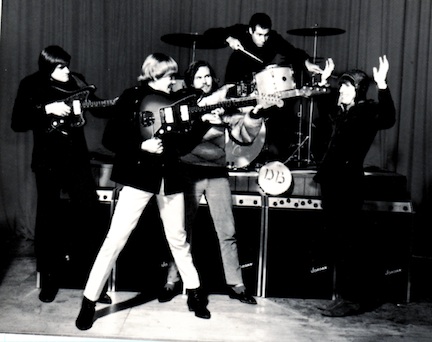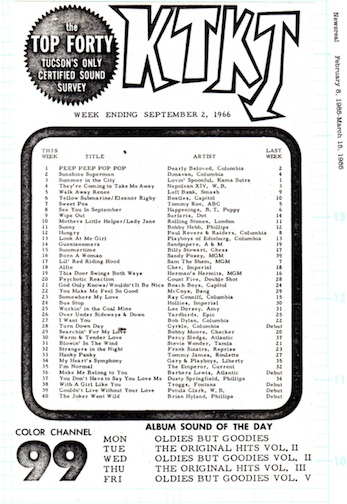|
In June of 1964 five young gentlemen, all with a great deal of musical ability, formed a pop group in Tucson, Arizona. Their name .... “Intruders.” They weren’t much to see at first, in fact, they weren’t much to hear but as time rolled on the “Intruders” became the most popular attraction in the Southwest. Photo of Dearly Beloved, Newsreal Magazine, February 1985, cover. By Lee Joseph During the early to mid ‘60s, Tucson consisted of an Air Force Base, which greatly contributed to the city’s existence, a college, and a population not too far from 25,000. This writer has many memories of Tucson, Arizona as a small, but busy town. I can even visualize the 22nd St. and Swan Road area, when it was nothing more than a four-lane road with no divided median! Tucson also had a great deal of rock and roll. Besides the usual healthy dose of local, national, and British rock exposed on TV in the ‘60s, and two rock radio stations, Tucson also had over 15 rock groups and numerous places to play around town. In the words of those who played in bands during that era, “there was so much happening because people were truly interested in music.” At one time, bands were one of the only outlets for high school and college kids. Groups were a symbol of something kids needed and wanted in their lives. When audiences came to a gig, they knew the band was playing for them. Gigs sprung up everywhere! There were bands playing at lumber yard sales, hamburger stands, and just about anywhere else an amp could be plugged in. At one time, there were about four successful local teen clubs. They were national trends at the time. For fifty cents you could spend an afternoon or evening dancing to the sounds of a live group. There was no alcohol, just guys, girls and groups. Every third week or so a name act showed. Bars also existed, however, with a drinking age of 21. There was a definite local sound, though groups didn’t sound exactly alike. Band members were always going to each other’s shows, and really paying attention. From ‘64 to ‘68 there was a great scene here in Tucson that directly links to the ‘60s Punk phenomenon. In most every U.S. city, young people formed groups. They put out their own records, or records were put out by small-time entrepreneurs and local DJ’s. These (now) highly sought-after discs are turning up on many compilation LPs. The raw edge and honest adolescent energy of many ‘60s local records, appeal to those who are fed up with the ‘plastic’ contemporary sounds heard on radio today. The Dearly Beloved make the Tucson sceneOut of many local Tucson bands, including: the Five Of Us, the Grodes, the Occasionals, the Bassmen, the Sot Weed Factor, the Lewallen Brothers, and more, the Dearly Beloved were definitely the most popular of all. They had seven 45s, two of which were on Columbia, and the group played in Tucson and cities in and out of Arizona with groups like Paul Revere and the Raiders, The Seeds, The Mammas and The Papas, The Buffalo Springfield, The Leaves, and many others. The Dearly’s also had a massive local following. When the group began in 1963, they called themselves The Intruders. They played surf music (influenced by the Ventures) at roller skating rinks for $10 a night. When the Beatles became popular, The Intruders hired localist Larry Cox. About a year into the group’s existence, they won a local Battle of the Bands; the prize– a recording session in a ‘real’ studio, which turned out to be some guy’s living room. One take was ruined by the engineer’s mom flushing the toilet! This became their first 45 “Every Time It’s You.” At this time, the group consisted of Larry Cox on vocals, Tom Walker on guitar and vocals, Terry Lee on guitar and vocals, Pete Schuyler on drums, and a bassist. Soon after, Shep Cooke joined. Shep had been playing folk music at local ‘beatnik’ clubs. However, when Shep saw girls charging after the group while they were opening for the Tucson premier of “A Hard Days Night,” at a local drive-in, he decided he wanted a piece of the action! At first, Shep was going to play keyboards, but when the bass player quit, the job was handed to him. Although he had never played bass, he learned quickly. The first three Intruders’ 45s represent the group learning to play in a studio. “These records didn’t reflect our live sound,” said Tom Walker. The cuts do have their moments, especially on “Every Time It’s You,” a wild Beatleish punker, and the B-side of their third 45 called “Why Me.” This song has some ripping fuzz guitar played by Tom, who had just bought a new Maestro fuzz box. During the session, the engineer said, “This is the most awful guitar sound I’ve ever heard in my life,” which made Tom quite happy!
Undated photo of the Dearly Beloved, from Newsreal, February 8-March 18, 1985. Page 6. The success of a black group from Detroit also called the Intruders, prompted the group to change their name. They choose the name The Quinstrels. Although a 45 was released under this name, the group never used it on stage. The next record was released by their manager, Dan Peters, on his Moxie label. Their manager had put out all the early Intruders records except “Every Time.” The Moxie label also had two releases by The Breakers and Five More, two Tucson groups no one seems to know anything about. The “I’ve Got a Girl” record (released by the Quinstrels in 1965) displayed a new sound for the group. The song began with a 1950s a-cappella intro leading into a ripper, killer, ‘60s love song with a wild lead for four part harmonies. For the first time, the group (in their own words) “really let loose in the studio.” The fact that everyone in the group could sing, gave them a tight and unique vocal sound. The “I’ve Got a Girl” single was recorded at Audio Sound Recorders in Phoenix, and was the group’s first outing in a ‘professional’ 8-track studio, The version of “I’ve Got a Girl” that appears on (this) the Voxx Dearly Beloved LP, is not the 45 version, but an alternate version from 1966. However, the original version would be reissued in the near future. Enter Dan Gates, a disc jockey from the local radio station KTKT. Dan had a rich history in radio and was involved in many recording sessions in California in the early ‘60s. During the time Gates became involved, the band’s name was changed to the Dearly Beloved. The name was perfect for media hype, “for they were no longer Intruders because now they are Dearly Beloved,” as stated in their press release of late ‘65. One evening, Dan came to a Dearly Beloved practice with a tape of a song called “Peep Peep Pop Pop.” The tape consisted of a real primitive recording of some Black teens pounding on a piano singing, “Peep, Peep, Pop, Pop,” in real high voices. Dan had this tape since the early ‘60s when he recorded it in California, and always had high hopes for the song. However, the Dearly’s refused to touch it because they thought the song sounded stupid, silly, and several other derogatory descriptions. Gates was persistent and finally coaxed the group into recording the song. Dan took the Dearly’s back to Audio Recorders for the sessions. A deal was set up with the Boyd label of New Mexico, to release the record. (Note: the Boyd release of “Peep, Peep...” b/w “It Is Better” had the artist’s name listed as The Beloved Ones. No, the group didn’t change their name again. It was purely a mistake on the label’s part.)
KTKT playbill, ranking “Peep Peep Pop Pop” by the Dearly Beloved as Number 1 for the week ending September 2, 1966. From Newsreal, February 8-March 18, 1985. Page 6. “Peep Peep...” became very popular in Tucson, Phoenix and many other Southwestern cities. The record held a No. 1 position on KTKT’s Top 40 chart for several weeks and reached the No.1 spot of 1966 in Tucson. Bobby Boyd convinced Columbia to sign the group on the strength of reported sales of 250,000 copies of “Peep Peep...” The record entered the bottom of Billboard’s Top 100. “Peep Peep” played on many national radio stations and made it to American Bandstand’s “Rate-A-Record” where it was chosen over the Count Fives’ “Psychotic Reaction.” Unfortunately, when Columbia picked up the record, Boyd label copies were still in stores in several western states. Columbia didn’t print many copies because of this, so the record faded into obscurity due to unavailability. During 1966, The Dearly Beloved played outside Arizona quite often. The group frequented clubs like Gazzaris and the Hullabaloo on Sunset Strip in Hollywood, and also played teen fairs around the country. The Dearly Beloved had lots of things going for them. The band was tight and powerful in the studio, as well as live. They were superb musicians, vocalists, and had great times traveling, meeting other bands, and just being in the middle of what is now referred to as ‘60s youth culture.” During their peak, the Dearly’s played for as many as 14,000 people as an opening act at concerts. In mid-1966, the group went to L.A. to cut an LP for Columbia, in the Columbia Studios. On the lighter side of things, the group was recording at the same time that Paul Revere and the Raiders were cutting tapes for a 45. The Dearly’s rubbed shoulders with the Raiders and enjoyed the spill-off of Raiders groupies. The group rehearsed in the ballroom of the Knickerbocker Hotel in Hollywood, then they would go to the studio and record. In the evening, the group chased girls on the Strip. On the darker side, though, the group was rushed recording approximately 20 songs in 3 half-day sessions– the same time the Raiders’ were allotted to record one single. Although the sessions were rushed, there were a number of great songs recovered from the Voxx LP. Two cuts from the sessions, “Wait Till The Morning,” (written by Tom Walker), and “You Ain’t Gonna Do What You Did To Him To Me” (written by Grodes leader, Manny Freiser), were released as a 45 and almost made it to Billboard’s Hot 100. Unfortunately, the deal with Columbia didn’t go too well. Besides rushed sessions, Columbia never released an LP or even promoted the group. In those days, major labels were always signing groups and just letting them ‘hang’ due to indecisions as far as which groups should really be pushed, and tax write-offs. So, in the summer of ‘67, the Dearly’s sued Columbia to get out of the contract. The Dearly Beloved became an “available” group. During this time, drummer Pete Schuyler was replaced with Grodes member Rick Mellenger. A two-day span during another L.A. trip reads like a soap opera and changed things for the group. The Dearly’s were playing a club in Tarzana with the Leaves. Representatives of the White Whale label were present. The label was interested, had an amount of money in mind, and promised to do all the things that Columbia didn’t, so contracts were signed. The band was rehearsing all day and playing that night. They had a new contract, money, and were convinced that things were going straight up. Larry Cox needed to get to Tucson the next day because he was going to get married. They waited for the other groups to tear down, then tore down their equipment and left L.A. at 3:00AM. Larry Cox killed in crashEverybody took turns, each driving about 100 miles. The group was exhausted and had all fallen asleep including the driver. The group crashed outside Yuma, Arizona. Larry Cox was killed instantly and the rest of the group suffered injuries. When Larry died, it voided the White Whale contract because of a clause stating the band would have to stay intact. The Dearly Beloved tried to keep the band going and succeeded for a little while. They rehearsed as a four-piece but didn’t feel comfortable without a lead singer. They worked with other singers who were good, but didn’t get the same feel. Another record was released on Tucson’s Splitsound label, which was owned by Dan Peters and Dan Gates. Quite a few 45s came out on Splitsound in the ‘60s. The A-side of the last Dearly’s 45, “Merry Go Round,” was a haunting tune that Larry Cox had written. It’s ironic that “Merry-Go-Round” was a song about death that Larry Cox wrote shortly before the tragedy of his own. The A-side didn’t go over too well, but the B-side, “Flight 13” became a regional hit. The song is another punky ripper with a fantastic bass line. Bo St. Runners’ vocalist Jim Perry sang on “Merry-Go-Round,” and Terry Lee sang on “Flight 13.” Turning point for the Dearly BelovedThe final days of the Dearly Beloved went like this. Linda Ronstadt was in L.A. when “Different Drum” was released. The Stone Poneys bassist had just quit and Linda Ronstadt kept getting in touch with Shep Cooke, asking him to join the group. Shep insisted the Dearly’s were too good to quit, but said, “If Different Drum” goes Top 10, I’ll do it.” Well, the song went to No. 11 and Shep went for it. The Dearly’s got another bass player. Shep went on tour across the country with the Stone Poneys but ended up coming back to Tucson and rejoined the Dearly Beloved. To top it all off, Shep got into a motorcycle accident and couldn’t play for six weeks. At that point, the Dearly Beloved hung it up, leaving an incredible history and era behind them. Since the group’s breakup, only Tom Walker and Shep Cooke continue to play music as a profession. Tom joined Butterscotch (which includes Westwood Recording Studio owner, Fred Porter), who later became Jon Sorrow and cut a tune for a soundtrack LP for “Hells Angels ‘69.” However, the Tower record label changed Jon Sorrow’s name to The Stream of Consciousness without ever telling the group. Shep started the Floating House Band in 1970, and also played on LP’s with Jackson Browne, Linda Ronstadt, Tom Waits, as well as releasing two solo LP’s. Walker also played on many records and composed songs used on Chuck Wagon and the Wheels LP’s. Tom and Shep also played together off and on between 1974 and 1983 at many Tucson bars and restaurants. Shep and Tom had a very large repertoire with Tom supplying the rock and roll roots and Shep the blues and folk influences. Today, Shep is always on the road with the Seekers. As far as other former members of the Dearly Beloved’s post group activities, Pete Schuyler joined the Marines and is now working in electronics, Rick Mellenger is an inhalation therapist, and Terry Lee is a successful architect in Tucson. Other Dearly Beloved ‘alumni’ (who were in the group but weren’t on any records) include, Lenny Lopez on drums, Val Valentino on bass, and Rom Ripley on vocals.
2014 © Entertainment Magazine and BZB Publishing, Inc., Robert Zucker and Newsreal,
Jonathan L. All rights are reserved. These are the compiled works of
contributed materials from writers and photographers previously
published in the Tucson Teen, Magazine, Entertainment Magazine and Newsreal newspapers, and from Entertainment Magazine On Line
(EMOL.org). No part of the material protected by this copyright may be
reproduced or utilized in any means, electronic or mechanical, without
written permission from the publisher. Permission is granted to use
quotes and cite references to the contents in this book with proper
credit noted: “Entertaining Tucson Across the Decades,” © 2014
Entertainment Magazine.”
Return to Entertaining Tucson
|
|


